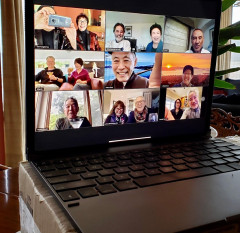Lifestyle Spotlight
The Year of Sheltering Dangerously By Ben Fong-Torres
The Year of Sheltering Dangerously
By Ben Fong-Torres
Well, hasn’t THIS been a fun 365?
As we approached the anniversary of the shelter-in-place orders for the San Francisco Bay Area, on March 16, I thought of some of the changes we’ve been through.
In February, our calendar was packed with restaurant dinners and a large, loud gathering at Harbor Villa, saluting our friend, the civil rights attorney Dale Minami.
And there was my 24th time as co-anchor of the...
Memorial Services January 6 for Civil Rights Leader Gordon Hirabayashi 1918 - 2012
|
SAN FRANCISCO - The Fred T. Korematsu Institute for Civil Rights and Education, along with the members of the Asian American Center for Advancing Justice (Advancing Justice) - Asian Law Caucus, Asian American Justice Center, Asian American Institute and Asian Pacific American Legal Center - mourn the loss of civil rights leader Gordon Hirabayashi, who passed away on January 2, 2012 in Edmonton, Alberta, Canada at the age of 93. His former wife, Esther Hirabayashi, passed away in Edmonton just hours later on the same day. She was 87.

He is survived by his wife, Susan, his children, Marion, Sharon, and Jay, his brother, James, and his sister Esther (also known as Tosh Furugori). "He was a great father who taught me about the values of honesty, integrity and justice," says his son, Jay Hirabayashi. "He was rightly recognized as a hero, but he never saw himself that way. He saw himself as someone who did wh
at he had to do to stand up for the rights he believed in."
In 1942, Hirabayashi was a 24-year-old student at the University of Washington when President Franklin Roosevelt issued Executive Order 9066, ordering the incarceration of 120,000 innocent people of Japanese ancestry. Hirabayashi, an American citizen, turned himself into the FBI in order to intentionally defy a curfew law imposed on all west coast residents of Japanese ancestry. After he was arrested and convicted, Hirabayashi appealed his case to the U.S. Supreme Court. Similar toKorematsu v. United States (1944), and Yasui v. United States (1943), the Supreme Court sadly ruled in Hirabayashi v United States (1943) that the curfew law was justified due to military necessity. Hirabayashi was sent to a prison camp in Arizona.
In 1983 and 1987, after the discovery of new evidence proving the government had known there was no grounds for the mass incarceration, both Korematsu and Hirabayashi re-opened their cases, leading their convictions to be overturned in the U.S. District Court N.D. Cal. and the U.S. Court of Appeals 9th Cir., respectively. Their cases never reached the U.S. Supreme Court again, and the high court's decisions in Korematsu v. United States and Hirabayashi v. United States are widely condemned as one of the darkest chapters in American legal history. Min Yasui's case was also re-opened in the 1980s, but Yasui passed away in 1986 before his second case was decided.
"Gordon Hirabayashi was a principled man of peace who, with the courage of his convictions, left us with an enduring legal and social legacy," says Rodney L. Kawakami, lead attorney for the Hirabayashi 1980s legal team. "He inspired us to remember that our Constitutional rights come with a price and that we have an obligation to be constantly vigilant to protect these cherished rights by speaking out in times of crisis, even when unpopular."
Hirabayashi went on to teach sociology for many years at the University of Alberta in Canada. In 1999, the former Catalina Federal Honor Camp near Tucson, AZ, where Hirabayashi was sentenced to hard labor in the 1940s, was renamed the Gordon Hirabayashi Recreation Site. Since 2007, the East West Players, an Asian American theater company, has produced stage productions based on his life, entitled, "Hold These Truths" by Jeanne Sakata. In May 2011, acting U.S. Solicitor General Neal Katyal released an unprecedented "confession of error" in the Korematsu and Hirabayashi cases.
MEMORIAL SERVICE, DONATIONS
Quaker Memorial Meeting for Worship
1:00pm Friday, January 6, 2012
Edmonton Japanese Community Association
6750 88 Street Northwest Edmonton, AB T6E 5H6
(780) 466-8166
In lieu of flowers for Gordon Hirabayashi, donations can be made to:
In lieu of flowers for Esther Hirabayashi, donations may be made to the Canadian Association of Medical Teams Abroad, c/o 103 Laurier Drive, Edmonton, AB, Canada T5R 5P6.
UPCOMING EVENTS
On February 11, 2012, the Fred T. Korematsu Center for Law and Equality at Seattle University School of Law will hold a day-long event commemorating the 25th anniversary of the overturning ofHirabayashi v. United States. The event will feature multiple panels and an exhibit. For more information, visit www.law.seattleu.edu.
The University of Washington Press is planning to release a biography of Gordon Hirabayashi co-authored by his brother, James, and nephew, Lane. The working title is A Principled Stand: Gordon Hirabayashi v. the United States.
The Fred T. Korematsu Institute for Civil Rights and Education (www.korematsuinstitute.org), a program of the Asian Law Caucus, is dedicated to advancing pan-ethnic civil rights and human rights through education.
The Asian American Center for Advancing Justice (www.advancingjustice.org) works to promote a fair and equitable society for all by working for civil and human rights and empowering Asian Americans and Pacific Islanders and other underserved communities, and is comprised of the Asian American Justice Center (www.advancingequality.org), the Asian American Institute (www.aaichicago.org), the Asian Law Caucus (www.asianlawcaucus.org) and the Asian Pacific American Legal Center (www.apalc.org).
|


